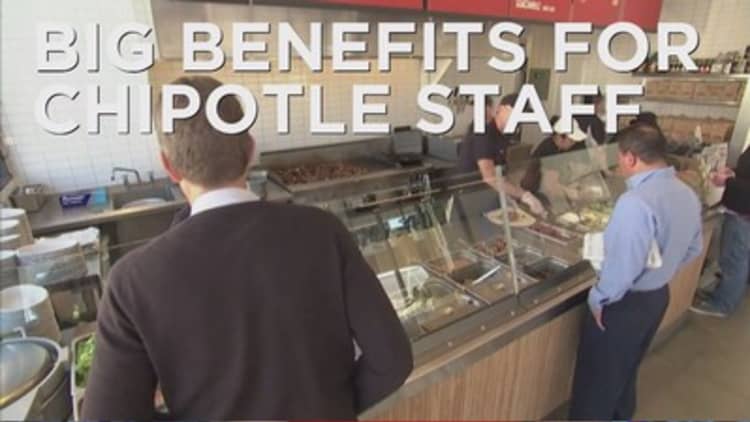
Hoping to boost recruitment and retention amid a tightening job market, Chipotle Mexican Grill has revealed it will offer new benefits for employees including tuition reimbursement.
The benefits—available to hourly workers—begin July 1 and also will include paid vacation time and paid sick leave.
"We are always working to attract and retain the very best employees we can, and to helping develop our people so they can achieve their full potential," said Chipotle spokesman Chris Arnold in an email to CNBC.com. "As part of that effort, we are changing our benefits package," he said.
As competition intensifies for qualified workers, more younger employees are demanding attractive hiring packages.
"Younger workers these days, they understand their worth and they're demanding more out of their employers," said Judy Conti, federal advocacy coordinator for the National Employment Law Project. The nonprofit pushes for worker protections and higher minimum wages.
In April this year, Starbucks announced it's expanding its employee college tuition assistance program to cover the entire cost of getting an online bachelor's degree. The Seattle-based company launched the "Starbucks College Achievement Plan" with Arizona State University in June 2014. The company previously limited the program to juniors and seniors.
Read More Starbucks expands college tuition benefit for workers
Chipotle joins other corporations that have moved to boost benefits and in some cases raise wages.
Companies that have lifted hourly rates include Wal-Mart, Gap, McDonald's and TJX.
Chipotle recently revealed its benefit package changes in a conference presentation, though offered limited details. No press release has been issued, and there was no announcement about raising hourly wages for its workers.
During an investor call with Wall Street analysts in January of last year, Chipotle co-CEO Monty Moran said average wages are at $9 an hour, and that a move to $10 would have an effect, "but not too significant."
Read MoreHow feel-good companies are navigating the minimum-wage fray
Numerous studies show younger workers, in particular, are aware of corporations' track record when it comes to social issues, ranging from the environment to wages. More younger consumers spend money based on their values. And companies including Starbucks and Chipotle are taking notice.
Last month, Denver-based Chipotle announced it has achieved its goal of using only non-GMO ingredients. (GMOs are genetically modified organisms.)
"Thesebenefit changes come in addition to offering extraordinary opportunities," said Arnold of Chipotle. "Rightnow, more than 90 percent of our managers come from within the ranks of our crews.Last year alone, we promoted more than 10,500 people who started as crew intomanagement positions," he said.
Setting industry standards for benefits
Decisions by specific companies and select cities to improve worker benefits and wages are shaping a national dialogue about work conditions and fair pay.
"We applaud Chipotle for its decision to expand paid sick days and paid vacation to its hourly employees," said Ellen Bravo, executive director of Family Values at Work, in a prepared statement. The nonprofit works to promote paid sick days and affordable family leave.
"In an industry where the overwhelming majority of hourly workers have no access to paid time off, this move represents important leadership by Chipotle," Bravo said. Advocates hope moves by bellwether corporations like Chipotle will prompt others to follow.
"At a place like Chipotle where consumers and workers really are trying to do better and better, by offering workers paid sick days and better wages, it's going to set some standards for the rest of the fast food industry," said Conti of the NELP.
Raising the minimum wage
Beyond corporations, individual cities and states are moving to boost pay.
Los Angeles recently joined other cities including Seattle, San Francisco and Chicago that have moved independently to raise wages beyond the current, federal minimum wage of $7.25 an hour.
New York Gov. Andrew Cuomo has gathered a special wage board to review and recommend higher hourly rates for state fast food workers. At a wage board hearing last week, advocates and workers who earn under $10 an hour testified in support of $15 an hour.
Beyond higher pay, advocacy groups hope to push employers to end "just in time" scheduling, which gives workers little if any notice of available hours.
Such benefits affecting Main Street workers and the minimum wage are likely to be flash point issues heading into the 2016 presidential election. And workers, young and old, will be on alert.
Fast food and retail chains, "they're all competing for the same workers and they want the best workers," Conti said. "When it's a race to the bottom, you don't engender loyalty among your workers."
Read MoreAs minimum wages rise, some say too little, too late


